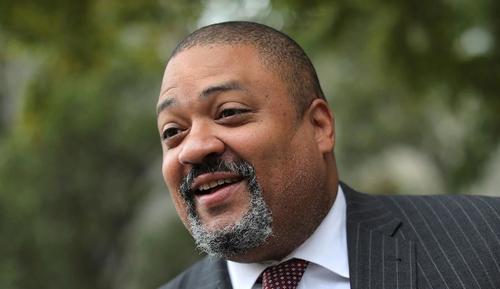Manhattan’s Soros-Funded DA Lays Foundation For Next Crime Wave; Instructs DAs To Drop Prison Sentences
Manhattan’s newly elected DA, Alvin Bragg, has ordered prosecutors to stop seeking prison sentences for most offenses, and to downgrade felony charges in cases which include armed robberies and drug dealing, according to the New York Post.

In his first memo to staff on Monday, Alvin Bragg said his office “will not seek a carceral sentence” except with homicides and a handful of other cases, including domestic violence felonies, some sex crimes and public corruption. -NY Post
“This rule may be excepted only in extraordinary circumstances based on a holistic analysis of the facts, criminal history, victim’s input (particularly in cases of violence or trauma), and any other information available,” reads Bragg’s memo.
According to Bragg, whose campaign was funded in part with a $1 million donation from billionaire George Soros, also told assistant DAs that they must now keep in mind the “impacts of incarceration,” including whether it actually increases public safety (ZH: to keep violent criminals physically separated from the public? Uh, yeah…)
This is insane. You can carjack a dozen people at gunpoint, and as long as you don’t use the gun to seriously injure someone, the Manhattan DA won’t seek prison time for you. https://t.co/gubG1s5TDk
— Amy Swearer (@AmySwearer) January 4, 2022
When prosecutors want to put a convict behind bars, they can’t ask for more than 20 years for a ‘determinate’ sentence – i.e. one which can’t be reviewed or changed by a parole board, according to the report.
What’s more, “The Office shall not seek a sentence of life without parole,” which according to state law is a punishment reserved for the worst offenders; murderers, terrorists, serial killers, cop killers, and people who kill children under the age of 14 during sex crimes or torture.
More via the Post:
Bragg’s memo also detailed the following instructions for prosecutors to reduce charges filed by cops in various cases:
- Armed robbers who use guns or other deadly weapons to stick up stores and other businesses will be prosecuted only for petty larceny, a misdemeanor, provided no victims were seriously injured and there’s no “genuine risk of physical harm” to anyone. Armed robbery, a class B felony, would typically be punishable by a maximum of 25 years in prison, while petty larceny subjects offenders to up to 364 days in jail and a $1,000 fine.
- Convicted criminals caught with weapons other than guns will have those felony charges downgraded to misdemeanors unless they’re also charged with more serious offenses. Criminal possession of a weapon in the third degree, a class D felony, is punishable by up to 7 years behind bars.
- Burglars who steal from residential storage areas, parts of homes that aren’t “accessible to a living area” and businesses located in mixed-use buildings will be prosecuted for a low-level class D felony that only covers break-ins instead of for more serious crimes. Those more serious crimes, class B and class C felonies, would be punishable by up to 25 and up to 15 years in prison respectively.
- Drug dealers believed to be “acting as a low-level agent of a seller” will be prosecuted only for misdemeanor possession. Also, suspected dealers will only be prosecuted on felony charges if they’re also accused of more serious crimes or are actually caught in the act of selling drugs. That felony would mean facing up to seven years behind bars.
According to Bragg’s memo, “ADAs should use their judgment and experience to evaluate the person arrested, and identify people: who suffer from mental illness; who are unhoused; who commit crimes of poverty; or who suffer from substance use disorders,” while “Charges should be brought consistent with the goal of providing services to such individuals, and leverage during plea negotiations should not be a factor in this decision.”
Bragg claims the changes will “not only will, in and of themselves, make us safer; they also will free up prosecutorial resources to focus on violent crime.”
What’s more, “new initiatives and policies on guns, sex crimes, hate crimes, and other matters will be announced in the coming weeks.”
The head of the NYPD Detectives’ Endowment Association, Paul GiGiacomo, came out swinging against Bragg’s memo.
“Bragg gives criminals the roadmap to freedom from prosecution and control of our streets,” he said, adding “In Bragg’s Manhattan, you can resist arrest, deal drugs, obstruct arrests, and even carry a gun and get away with it.“
Meanwhile, the head of the NYPD’s largest union expressed “serious concerns about the message these types of policies send to both police officers and criminals on the street.”
“Police officers don’t want to be sent out to enforce laws that the district attorneys won’t prosecute,” said Police Benevolent Association president Patrick Lynch. “And there are already too many people who believe that they can commit crimes, resist arrest, interfere with police officers and face zero consequences.“
(h/t Byron York)
Tyler Durden
Wed, 01/05/2022 – 10:00
Zero Hedge’s mission is to widen the scope of financial, economic and political information available to the professional investing public, to skeptically examine and, where necessary, attack the flaccid institution that financial journalism has become, to liberate oppressed knowledge, to provide analysis uninhibited by political constraint and to facilitate information’s unending quest for freedom. Visit https://www.zerohedge.com